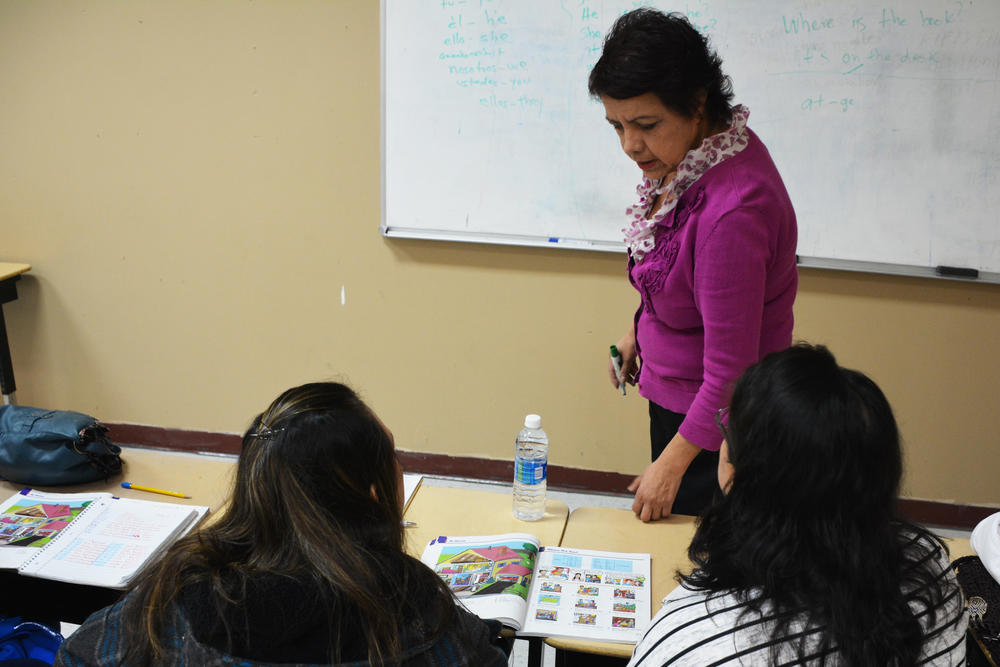Section Branding
Header Content
After Almost A Decade, An Immigration Enforcement Program Still Divides A Georgia Community
Primary Content
Earlier this year, President Donald Trump issued an executive order calling for sheriffs and police departments to take a larger role in immigrations enforcement.
He asked them to join a voluntary Immigrations and Customs Enforcement program called 287(g), which extends the reach of immigration agents into counties across the country.
But the program is nothing new for northwest Georgia’s Whitfield County, where one-third of the population is Hispanic.
After a nearly decade of participation by the county sheriff’s office, 287(g) still divides the community.
On Saturday mornings, a group of volunteers turns the Delray Farms Fresh Market in Dalton into a classroom.
They occupy a large room in the back of the store, where desks cluster in front of whiteboards and strings of colored paper flags hang from the ceiling.
One recent weekend, a group of women sat and listened to Spanish words for the parts of the home and called out their English counterparts.
“Baño: bathroom. Cocina: kitchen. Sótano: basement,” they intoned as America Gruner led the the exercise.
Gruner runs the Coalition of Latino Leaders. The group offers free English classes to Dalton's Hispanic community, which made up about half its total population in 2010.
By comparison, Hispanics made up just under nine percent of Georgia’s entire population the same year.
They’ve arrived in the last few decades and support the area’s flooring industry. Dalton calls itself the “Carpet Capital of the World.”
This month, Gruner’s reviving a campaign to remind people who are in the country illegally not to drive without a license or while intoxicated.
She’s also enlisting volunteers from the community to offer rides to people who might need them.
“It’s to prevent people from being detained for traffic offenses,” she said, taking a break between lessons. “So, we call it ‘Route of Freedom.’”
Gruner launched Route of Freedom in 2009, a year after Whitfield County signed on to 287(g).
Under the program, law enforcement agents can check anyone arrested against federal immigrations databases, which can lead to their deportation.
Across the country, 37 law enforcement agencies are currently signed on.
In Georgia, four counties participate: Cobb, Gwinnett, Hall, and Whitfield. ICE says the program removed 2,184 individuals from the state in fiscal years 2014, 2015, and 2016.
Gruner said the early days of 287(g) in Dalton were tense.
“Houses were abandoned and businesses were closing because a lot of people were detained and deported,” she said.
Gruner worries Trump’s recent executive orders on immigration will bring those days back.
“Everybody wants the law applied, until it’s applied to them sometimes,” said Whitfield County Sheriff Scott Chitwood.
He said 287(g) is misunderstood and argued it isn’t designed to target law-abiding citizens or even law-abiding unauthorized immigrants.
“It’s designed to remove that criminal element from the community, and I would like to think most people would support that,” Chitwood said.
Groups from the American Immigration Council to the American Civil Liberties Union have argued 287(g) leads to racial profiling.
And the program proved highly controversial in places like Maricopa County, Arizona, where former Sheriff Joe Arpaio used citizen “posses” to conduct raids targeting the Hispanic community.
For his part, Chitwood said he’s received some complaints about the program and has tried to reach out to the Hispanic community to explain that his officers aren’t out to get anyone.
Still, he acknowledged he’d not been entirely successful in getting that message across.
“I understand some individuals that have that fear that don’t [even] want to approach law enforcement. Can we ever get over that hump? I don’t know.” Chitwood said.
That fear creates a divide that Herman Nunez said he feels acutely.
He runs an empanada shop in downtown Dalton. It’s a place where you can get the ubiquitous Latin American pastry filled with Southern specialties like pimiento cheese.
Nunez said he tries to bridge the gap between his town’s Hispanic and American cultures.
“But here it is still very separate,” Nunez said.
Nunez doesn’t think that divide has much to do with policing. He’s alright with 287(g) and said people who are in the country illegally shouldn’t be given a pass if they’re caught breaking other laws, even something like driving without insurance.
“It’s a very sad situation: that’s the risk they knew they were taking,” he said.
But Atlanta immigration lawyer Charles Kuck said it’s not that simple. He argues law enforcement agencies don’t even need 287(g).
“Every law enforcement entity in Georgia is already effectively an immigration agent,” Kuck said.
He said Secure Communities and the Priority Enforcement Program have allowed local law enforcement agencies to refer people they arrest to ICE for consideration for removal.
287(g) simply extends ICE’s reach into participating communities, and Kuck said that sends a message.
“Well, I think programs like 287(g) give an impact to people that says, ‘Hey, we’re actually working to enforce the law,’” he said.
That message resonates throughout Whitfield County, especially in the grocery store where the Coalition for Latino Leaders’ free English classes have transitioned to a homework help session for local school kids.
“I can see the fear and the panic mostly in the children,” said Sujey Guzman, who volunteers with the group. “‘We don’t quite understand. I just know it’s going to affect our family,’ or ‘I’m not going to be able to see my mom and dad.’ That’s their main concern."
That anxiety likely isn’t going anywhere anytime soon.
Whitfield County’s current 287(g) agreement expires in 2019. Sheriff Scott Chitwood said he sees no reason to terminate the program.




